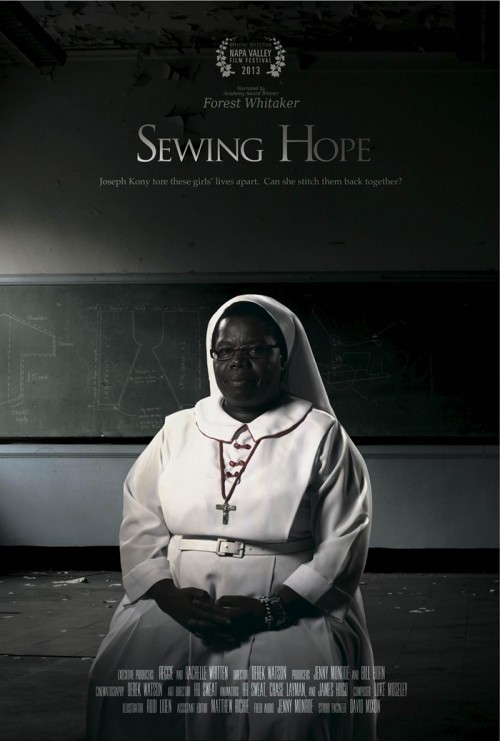I’m Episcopalian, which I like to tell people means I get the best parts of Catholicism and Protestantism – though it would probably be just as true to say we get the worst of both worlds. We do technically have nuns, but they don’t seem to be completely awesome the way Catholic nuns are.
Nuns are the BEST. What’s so interesting about them is that they operate simultaneously within and against a hierarchy. Anyone who cares about social justice can relate to the frustrations of trying to change institutions from the inside, often wishing you could opt out, but never being able to. Recently I saw two documentaries about awesome nuns being awesome feminist warriors in very different circumstances: Sewing Hope is about Sister Rosemary’s work to help women and girls in Uganda, while Radical Grace tells the story of three US nuns who fight for social justice.
The West does not have a very good image of Uganda. Hands up if you remember Kony 2012 and the associated controversy, not least of which was the issue of white saviorism. White people sure do love to swoop in and rescue brown people from themselves, completely eliding the history (and present) of western colonialism that is often the root of many of the problems in the Two-Thirds World. The cool thing about Sister Rosemary is that she is not a white savior. She’s a local Ugandan who runs a school for women and girls who were forced to be soldiers in Kony’s Lord’s Resistance Army. Many of these women were also sex-slaves, and bear the burden of social stigma on top of single parenthood and personal trauma.
Saint Monica’s, the school run by Sister Rosemary, trains the women in tailoring and baking, providing them with skills that are in demand both in the local hospitality industry and for the international sale of goods. The school not only helps them work toward economic independence, but it also provides a holistic, person-centered environment for healing.
What’s really extraordinary about Sister Rosemary’s work is that she’s not just providing skills from a brute economic bottom line – she’s helping trauma survivors recover. Early in the film, Sister Rosemary speaks about the importance of listening, and this is immediately followed by several women telling their own stories of horror and brutality. Sister Rosemary explains that her method is not to welcome girls by saying she knows what they have been through, but to provide a supportive environment. This includes both emotional support and very practical things like childcare.
Sister Rosemary is working within her context and making a difference from the ground up using the resources available to her and to women in her culture. The US context is very different, and so concomitantly are the methods and tactics of Sisters Simone, Jean, and Chris.

Being censured by the Vatican for “radical feminism” (no, not that kind of radical feminism) didn’t stop the sisters from fighting the injustices of their own society. As Nuns on the Bus, they traveled around assorted US cities and petitioned a number of politicians, campaigning for healthcare reform and now immigration reform.
The sisters are tackling issues both of wider society (poverty, the prison-industrial complex) and specific to the Catholic Church (women’s ordination). They are undeterred by the backlash they face, which ranges from the disapproval of the Church hierarchy to on-the-ground accusations of being “worse than pedophile priests” (yes, one protestor really says that).
The sisters are grounded in their commitment to the social gospel, which sees Jesus’ message as being primarily one of radical justice for the people on the margins of society. At the same time, the nuns are committed to thoughtful interrogation of their own faith, and to challenging the institution – which, as they say, is “always going to be ten years too late, if not a hundred” when it comes to social issues.
In some ways these nuns are an embarrassment to the hierarchy. They make the institutional Church look like a reactionary dinosaur; and yet it’s clear that they are working from a place of love. The Church is something they want to be better, and they’re taking matters into their own hands.

The filmmakers want us to see these stories and be moved by them to get involved. Whether it’s donating to Sister Rosemary and her women, or helping to get the final cut of Radical Grace finished so the story can get out there, they are hoping to motivate us to action. As Rebecca Parrish, director of Radical Grace, notes, there is potential for alliance between secular feminism and progressive religious movements, and we must overcome the divisions of ideology if we want to make the world a better place.
You can learn more about Sewing Hope here, or donate to the Radical Grace kickstarter here.
_____________________________
Max Thornton blogs at Gay Christian Geek, tumbles as trans substantial, and is slowly learning to twitter at @RainicornMax.

